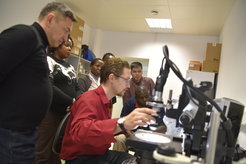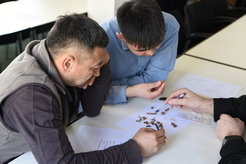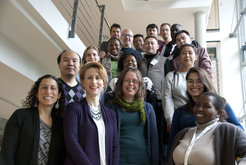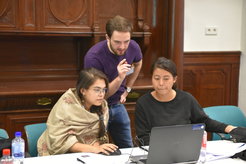International Application of Archaeological Science Workshop – 2020
Researchers in the Department of Archaeology are pioneering new frontiers, both in the laboratory and in the field. Their research agendas cover several fields of science and, geographically, span across six continents. The discoveries that these scholars are making are helping to clarify some of the least understood aspects of humanity’s past. The department is composed of seven laboratory systems, each of which consists of a team of scholars. These teams work closely together on projects, several of which span all groups in the department.
The department is composed of seven laboratory systems, each of which consists of a team of scholars. These teams work closely together on projects, several of which span all groups in the department. However, none of these scientific pursuits would be possible without a strong network of external collaborations. The collaborative network connects research institutes and scientists in Asia and Africa to Europe and beyond. This network is a necessary part of the department’s success. While many of the research institutes involved in these collaborations are highly funded world-class facilities, not every research institute has equal access to funding. It is an express goal of all of the archaeological science specialists in the department to help spread knowledge, especially in areas where the means of accessing such knowledge may be limited. The annual International Applications of Archaeological Science workshop is one of the ways these scholars are contributing to this goal and acknowledging the fact that their success rests on international collaborations.

It is an unavoidable reality of the modern world that access to education is note evenly distributed. The social dichotomy between developed and pre-developed nations is pronounced, and academia reflects these social inequalities. Some of the brightest and most motivated young scientists are held down by these barriers. Many of the archaeologists and biologists working at the Max Planck have found ways to assist scholars who may be interested in learning new methods in the archaeological sciences but do not have the means to participate in these studies firsthand. In the Department of Archaeology, scholars are flown in for collaborative workshops and training is provided in the field. In addition, all members of the department pull together their efforts for two weeks a year in order to provide training to a small group of motivated scholars. The Workshop sessions provide an intensive experience in developing and applying emerging methods of the archaeological sciences. The goal is not just to train the participants in the workshop, but to send the skills and knowledge back to their institutes and hopefully provide long-term opportunities for researchers who would otherwise not have them.

In the Department of Archaeology, scholars are flown in for collaborative workshops and training is provided in the field. In addition, all members of the department pull together their efforts for two weeks a year in order to provide training to a small group of motivated scholars. The Workshop sessions provide an intensive experience in developing and applying emerging methods of the archaeological sciences. The goal is not just to train the participants in the workshop, but to send the skills and knowledge back to their institutes and hopefully provide long-term opportunities for researchers who would otherwise not have them.
Training Course 2018

The department hosted an intensive, invitation-only, one-week workshop from the 13th to the 17th of March, 2018. The workshop was specifically designed for early career researchers from developing or pre-developed countries. More than 15 members of the department’s scientific community, including technicians, group leaders, postdoctoral scholars, and graduate students, donated their time in order to teach methods. The individual training sessions included both hands-on experience in the lab and lectures, as well as group discussions.
The instructors provided training and tutorials in a series of archaeological science approaches that have international applicability. The methods that were covered during the 2018 session, included quantitative lithics analyses, Geographical Information Systems approaches, proteomics, ZooMS, stable isotope analysis, archaeobotany, archaeozoology, chronological methods and models, and statistical analysis. Eight scholars were invited to participate in the session, coming from five different countries. The workshop was a rewarding experience for both the participants and the instructors.

The 2018 participants list:
|
Farhod Maksudov |
Institute for Archaeological Research, Tashkent |
Uzbekistan |
|
Malavika Chatterjee |
Deccan College |
India |
|
Ruokuonuo Rose Yhome |
Deccan College |
India |
|
Ruth Tibesasa |
University of Pretoria |
South Africa |
|
Kinyanjui Rahab Njuhi |
National Museum of Kenya |
Kenya |
|
Ndiema Emmanuel Kimuma |
National Museum of Kenya |
Kenya |
|
Ogola Christine Adhiambo |
National Museum of Kenya |
Kenya |
|
Tumurbaatar Tuvshinjargal |
National Museum of Mongolia, Ulaanbaatar |
Mongolia |
The program for the 2018 Training Course is accessible here.
Training Course 2019

In response to the overwhelmingly positive feedback in March of 2018, the Department of Archaeology ran a second international training workshop at the research facilities in Jena, Germany from March 19th through the 29th. The workshop again covered a variety of methods, including quantitative lithics analyses, Geographical Information Systems approaches, ancient proteomics, ZooMS, stable isotope analysis, both micro and macroscopic methods in archaeobotany, morphological identifications in archaeozoology, human osteology, chronological methods and models, and statistical analysis. Organized trips and tours of local prehistory museums and archaeological sites were also integrated into the program in 2019.
|
Pardaev |
Geofizika, Samarkand |
Uzbekistan |
|
Jamsranjav Bayarsaikhan |
National Museum of Mongolia |
Mongolia |
|
Muminkhon Saidov |
Institute of Archaeology, Uzbekistan |
Uzbekistan |
|
M. D. I. K. Abeynayake |
University of Sri Jayewardenepura |
Sri Lanka |
|
Nguyen Thi Mai Huong |
Vietnam Academy of Social Sciences |
Vietnam |
|
Nguyen Anh Tuan |
Institute of Archaeology, Hanoi |
Vietnam |
|
Keliang Zhao |
IVPP |
China |
|
Pamela Achieng |
University of the Witwatersrand |
South Africa/ Kenya |
|
Maggie Katongo |
Livingstone Museum |
Zambia |
|
Denis A. Miyagashev |
Russian Academy of Sciences |
Russia |
|
Kitov Egor Petrovich |
Institute of Archaeology, Almaty Kazakhstan |
Kazakhstan |
|
Ogeto Mwebi |
National Museums of Kenya |
Kenya |
|
Yekaterina Dubyagina |
Institute of Archaeology, Almaty, Kazakhstan |
Kazakhstan |
|
Zhuldyz Tashmanbetova |
Nazarbayev University, Astana, Kazakhstan |
Kazakhstan |
|
Martha Kayuni |
University of Zambia |
Zambia |
The program for the 2019 Training Course is accessible here.




